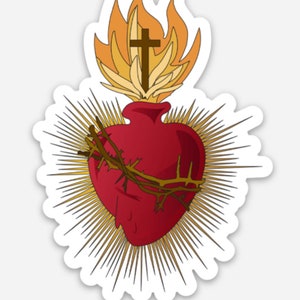My heart is overwhelmed,
my pity is stirred.
I will not give vent to my blazing anger,
I will not destroy Ephraim again;
For I am God and not a man,
the Holy One present among you;
I will not let the flames consume you.
The Sacred Heart of Jesus is often pictured with flames, and both images -- heart and flames -- appear in Hosea's complaint. But the prophet's flames are God's burning wrath against his people; his heart is overwhelmed with their sins. And then. compassionately, He swears that, despite his intense suffering, this raging inferno "will not consume you."
This image of a suffering God did not seem strange to Hosea or his hearers. They never supposed that the LORD who spoke to Abraham, called Moses from a burning Bush, and destroyed the Egyptian army while leading his Chosen People out of Egypt might be an impersonal force like a drought, famine, or earthquake. Much less, a stoic, impersonal, or distant god like that of the deists. If they could not see his face he was not faceless. Nor did he suffer their impudent disobedience lightly.
And so, when God's Son appeared in the village of Galilee and the streets of Jerusalem, they were not surprised by his familiar appearance. If some Jews had other issues with Jesus, and doubted that he might have a substantially different relationship with God, it wasn't because they supposed God could not be a caring father. They knew the LORD's passionate devotion to them but they were afraid of arousing his wrath, and knew nothing of his mercy.
Except for Abraham, Moses, and David, they had not known a God who had a particular relationship with any particular man or woman. They knew him only as the God of the people. If some prophets stood alone before God as they received his word and conveyed his message, they took no pleasure in the singular privilege.
Jesus, however, enjoyed God's love for him even as he obediently traveled to Jerusalem and certain death. And he alone spoke of "my Father and your Father, [of] my God and your God" as if the two relationships with the one Father were different.
The iconic Sacred Heart reassures us of the particular affection of Jesus for every person among the people of God. I need not hide from his face, nor should I hide my face from him.
As befits our visual age, the Sacred Heart is an image. It is not a poetic expression or a literary allusion to please one's aesthetic ear; it is not a complex formula (like the Trinity) to fascinate the intellect. The Lord himself invites us to gaze upon his heart, and see his intense, fiery devotion to us. Historians tell us the devotion developed out of Saint Francis's fascination with the Lord's five wounds. And, with the prayer Anima Christi, Saint Ignatius urged his disciples to take refuge within his sacred wounds.As the Easter Season of 2024 rapidly fades behind the rushing tide of today's events, we must still fix our gaze on his heart, as the Scriptures as the saints urge us. Troubled by the world's alluring, sometimes diabolical images, we look on his face, rest our eyes in his eyes, and feel the soothing relief of his smile come over us. His heart remains for us a safe place to hide from the world's assaults.


No comments:
Post a Comment
I love to write. This blog helps me to meditate on the Word of God, and I hope to make some contribution to our contemplations of God's Mighty Works.
Ordinarily, I write these reflections two or three weeks in advance of their publication. I do not intend to comment on current events.
I understand many people prefer gender-neutral references to "God." I don't disagree with them but find that language impersonal, unappealing and tasteless. When I refer to "God" I think of the One whom Jesus called "Abba" and "Father", and I would not attempt to improve on Jesus' language.
You're welcome to add a thought or raise a question.